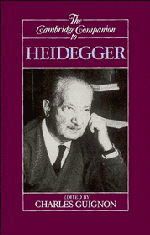Book contents
- Frontmatter
- Introduction
- 1 The question of being
- 2 Reading a life
- 3 The unity of Heidegger's thought
- 4 Intentionality and world
- 5 Time and phenomenology in Husserl and Heidegger
- 6 Heidegger and the hermeneutic turn
- 7 Death, time, history
- 8 Authenticity, moral values, and psychotherapy
- 9 Heidegger, Buddhism, and deep ecology
- 10 Heidegger and theology
- 11 Heidegger on the connection between nihilism, art, technology, and politics
- 12 Engaged agency and background in Heidegger
- 13 Wittgenstein, Heidegger, and the reification of language
- Bibliography
- Index
6 - Heidegger and the hermeneutic turn
Published online by Cambridge University Press: 28 May 2006
- Frontmatter
- Introduction
- 1 The question of being
- 2 Reading a life
- 3 The unity of Heidegger's thought
- 4 Intentionality and world
- 5 Time and phenomenology in Husserl and Heidegger
- 6 Heidegger and the hermeneutic turn
- 7 Death, time, history
- 8 Authenticity, moral values, and psychotherapy
- 9 Heidegger, Buddhism, and deep ecology
- 10 Heidegger and theology
- 11 Heidegger on the connection between nihilism, art, technology, and politics
- 12 Engaged agency and background in Heidegger
- 13 Wittgenstein, Heidegger, and the reification of language
- Bibliography
- Index
Summary
The closing decades of this century have been marked by a wideranging, multidisciplinary exploration of the theory of interpretation and its practical implications. To speak of a revolution in the history of thought is perhaps too grand, but certainly there has been a general movement that can be called the “hermeneutic turn.” This turn has taken various forms, including poststructuralist cultural studies, deconstructive literary studies, interpretive anthropology and social science, and critical legal studies. Of course, the specific turns taken in each of these fields are reactions to older ways of practicing each discipline. But in each case the emphasis on interpretation is used as an antidote, usually to objectivistic conceptions of the discipline's methods. However, none of these particular turns would have been imaginable without a dramatic change earlier in this century, the change brought about in philosophy by Martin Heidegger in 1927 in Being and Time. Heidegger's hermeneutic turn is taken most explicitly in Sections 31 and 32 of that book, where Heidegger makes interpretive understanding the central mode of human existence (or Dasein).
- Type
- Chapter
- Information
- The Cambridge Companion to Heidegger , pp. 170 - 194Publisher: Cambridge University PressPrint publication year: 1993
- 6
- Cited by

